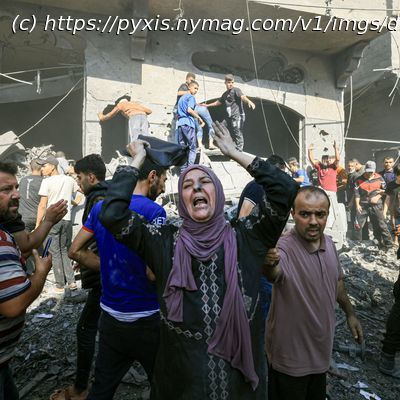Yousef Munayyer, a leading advocate for Palestinian rights, tells Eric Levitz that killing thousands of civilians in the Gaza Strip will only degrade Israel’s security in the long run.
Less than two weeks ago, Hamas militants entered Israel and murdered 1,400 people, the vast majority of whom were civilians. They killed entire families, burned people alive, massacred young people at a music festival, and filled babies with bullets.
Israel responded by choking off access to water, food, fuel, and electricity to the more than 2 million residents of Gaza and then proceeded to inundate the densely populated strip with more than 6,000 tons of bombs. Thus far, Israeli airstrikes have killed more than 3,000 Palestinians, including 1,000 children, according to the Palestinian health ministry. Forty-seven entire Gazan families have reportedly been killed. Nearly 13,000 Palestinians are injured. Gaza’s medical system was already struggling to care for the wounded before the al-Ahli Hospital was destroyed Tuesday. Other Palestinians have reportedly been reduced to drinking seawater. Conditions threaten to grow even more dire if and when Israel launches its impending ground invasion.
In the debate over the war, commentators often posit an inescapable conflict between ensuring Israel’s security and minimizing civilian casualties in Gaza. To prevent Hamas from menacing Israel, the thinking goes, the Israel Defense Forces must destroy its military capabilities. Yet since Hamas embeds itself in civilian infrastructure, Israel cannot defeat its enemy without killing innocents by the thousands.
But Yousef Munayyer believes that the supposed choice between Israel’s security and Gazans’ human rights is a false one. A Palestinian citizen of Israel and the head of the Palestine/Israel program at the Arab Center Washington, D.C., Munayyer argues that there is no military solution to Israel’s security dilemma. Reducing Gaza to rubble will only render it an even more fertile ground for violent extremism, guaranteeing that the region’s cycle of violence continues in perpetuity. In his view, the only way for Israel to win peace and security for its residents is to honor the Palestinians’ demands for freedom.
I spoke with Munayyer on Monday about conditions in Gaza, the failures of America’s Middle East policy, the case for a ceasefire, the “one-state solution,” how the October 7 attacks will change Israeli politics, and various objections to his outlook, among other things.
What is your sense of the current situation in Gaza? How does today’s humanitarian crisis compare to those generated by the war in 2014?
It’s a completely different order of magnitude. It’s hard to describe what we’ve been hearing. International humanitarian organizations are saying this is different than anything that happened previously. People who live in Gaza — we often talk about how we should understand that these are human beings, but I think to survive what they have survived, they must be superhuman in some way — but people who have lived through multiple wars and siege and occupation, they’re saying this is the worst that they have seen by far.
Of course, access to very necessary resources is cut off — electricity, water, fuel for backup generators. The basic services that people need. The hospitals are overflowing with the injured; ice-cream trucks are now being used because the hospital morgues no longer have capacity. Yeah, I don’t know. We could talk for an hour or days. You had a thousand children that have been killed already in nine days, which is double the number that the Israelis killed in the 2014 war, which lasted for over 50 days.
The Biden administration said Sunday that Israel would restore water to southern Gaza. But some reports out of that region suggest that water is still largely inaccessible. Have you heard anything about that issue from your connections in the region?
There’s some reports that people have limited and temporary access to water. But you have to remember that most of the water in Gaza — in normal times — is not fit for human consumption. And so often people rely on bottled water, especially in times like these. And there’s of course a limited supply of that. And so a basic necessity for human life is practically impossible to get now for many, many people. And those who do have limited supplies, they are dwindling very, very quickly. And that’s just one of the challenges that they’re facing right now.
As dire as the situation is today, it stands to grow worse upon Israel’s ground invasion, right? Do Gazans have any clear sense of what that would entail? Is there anything one can do to prepare for such a calamity?
To the extent that people are preparing for it, I can tell you that they are saying their good-byes. They are writing their last wills. They are huddled together with family members thinking that if they are going to be killed, at least they’ll all be killed together. When you have these massive bombardments in Gaza, entire families get wiped out. But other times, a family will have one lone survivor. Sometimes it’s an orphan child that has to live with that reality for the rest of their life. And there are many people who make sure to stay as close as possible to their loved ones, particularly as the bombardments increase in the areas that they’re in, so that if they’re killed, they’re all killed together.
Obviously, you consider Israel’s military campaign abominable for the contempt it’s shown toward civilians. And I agree. But for Israel, what do you think a just and rational response to the October 7 attacks would have looked like? How should Israel have responded to the murder of 1,400 people?
Well, I can tell you what it definitely doesn’t look like. It definitely doesn’t look like what we’re seeing now. This is not the first time that we have had this kind of bombardment of Gaza. This is something that has been repeated over and over again. It’s a policy that accepts the inevitable return of the same episode. Israeli policymakers refer to this as “mowing the lawn.” And there’s no morality in a war whose repetition is preplanned. This is about the absence of responsibility for protecting people. It’s only accepted because there is a sense that there’s no alternative.
And I think this line of thinking is incredibly dangerous for everyone involved, first and foremost for Palestinians because it’s always Palestinians that suffer in the greatest numbers — but not just for Palestinians. Do you think Israelis are going to be any safer because of the way that they’re torturing their neighbors in Gaza right now? Gaza is the most surveilled, most militarized spot on earth. All of the planes and the navy and the high-tech surveillance and the artificial-intelligence guns and under-the-ground tunnel detection and the high-tech missile interceptors and the troops and the every-other-year bombing the hell out of the place. How has that protected anyone?
There is always an alternative to mass killing. And the way I think this needs to be addressed is by resolving the underlying political grievances and the conditions that allow this to perpetuate. You have to remember that Israel occupied Gaza for 38 years on the ground before they pulled their troops out and continued their occupation from the outside. It was under those conditions that the Islamic resistance movement, Hamas, grew. So the idea that somehow Israel is going to do whatever it’s going to do in Gaza and somehow the issue is going to go away or there’s going to then be security — it’s just an insane way to think about this.
Netanyahu’s government might respond by saying that they agree “mowing the lawn” has failed, which is why they have ramped up bombardment so viciously, and plan to mount a ground invasion that will (supposedly) destroy Hamas.
The Israeli philosophy has been that to deter Palestinians from fighting back, we must hit them harder and harder. And each time that they have done that, the Palestinian fighters in Gaza have demonstrated greater capabilities, including in ways that, just a few days ago, shocked the Israeli security establishment.






